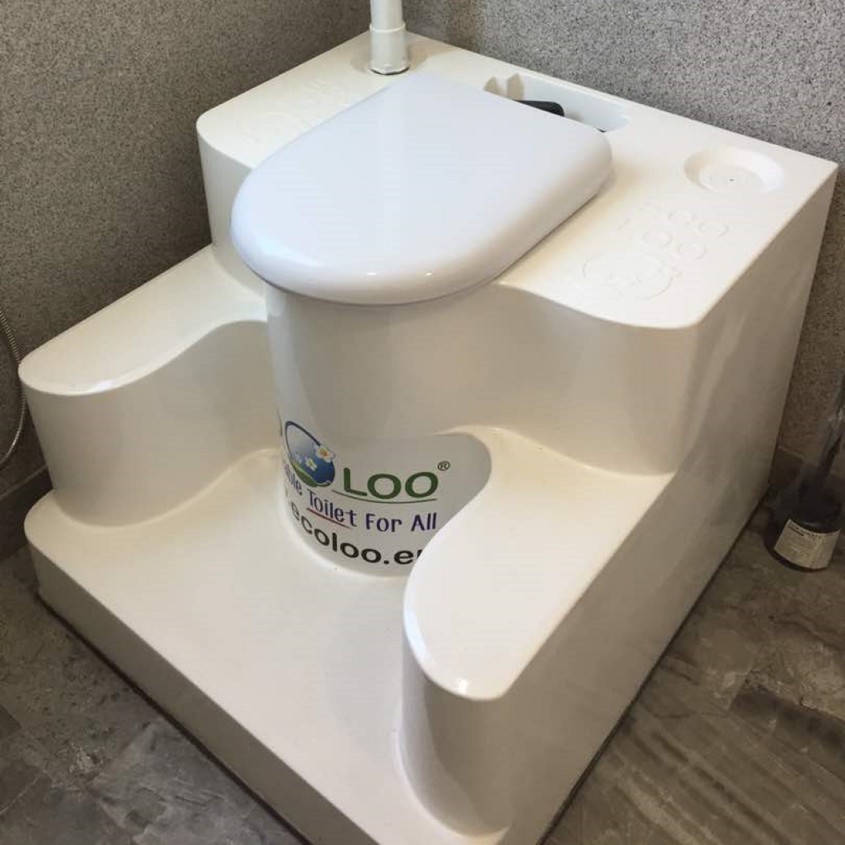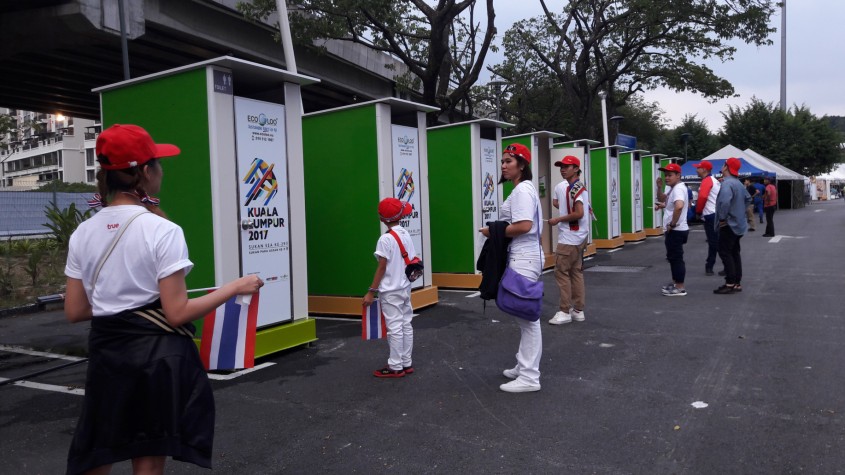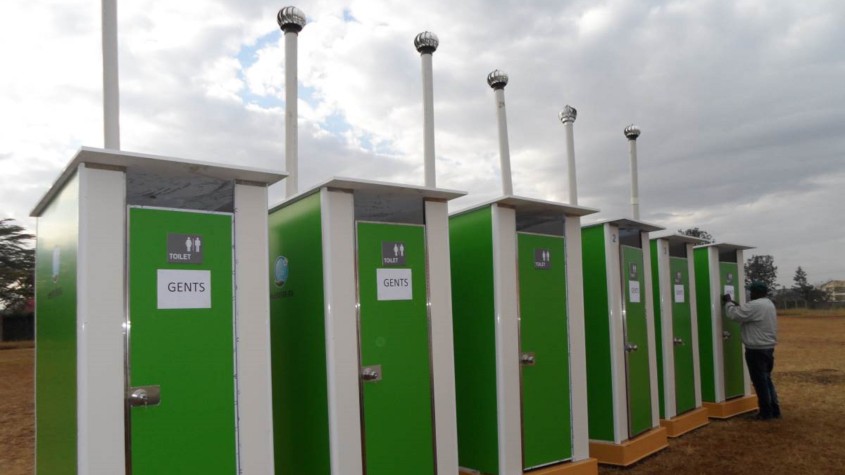Sustainable Toilets: Serving People, Serving the Environment
April 20, 2020
To mark World Intellectual Property Day 2020 Innovate for a Green Future, WIPO GREEN is showcasing a number of the climate-friendly technologies featured on the WIPO GREEN online database.
Two billion people, nearly one quarter of the world’s population, lack access to basic sanitation facilities such as toilets or latrines; 673 million people defecate in the open. The World Health Organization (WHO) estimates that at least 10 percent of the world’s population consumes food irrigated by wastewater, and that a cropland size of approximately 36 million hectares - almost the size of Germany – is irrigated by untreated wastewater. Poor sanitation remains a global challenge, one that leads to transmission of life-threatening diseases and contamination of both land and water. Addressing this challenge is one (Goal 6: Clean Water and Sanitation) of the 17 United Nations Sustainable Development Goals (SDGs).

Imad Agi, Chairman and CEO of Swedish company ECOLOO AB, first became interested in addressing poor sanitation after watching a documentary about this global challenge. Inspired by the urgency and massive repercussions of the problem, Mr. Agi developed a technology that could provide sanitation services in challenging conditions and improve the efficiency of modern sanitation facilities around the world. In 2008, he launched ECOLOO AB’s pilot project in the Municipality of Stromstad, Sweden, putting his innovative ECOLOO Sustainable Toilet technology (ECOLOO) into operation.

ECOLOO is a stand-alone, decentralized, biological toilet system that treats human waste by breaking down the solid waste into particles or ashes and converting the liquid waste into natural fertilizer. All biodegradable materials are digested by the bacterial culture present in ECOLOO’s chambers, including toilet paper and other degradable sanitary products. Meanwhile, the liquid waste undergoes a nitrification process and is converted into bio-fertilizer within 30 minutes.
The byproduct of ECOLOO is odorless, pathogen free, rich in nutrients and beneficial for organic farming as it replaces harmful chemical fertilizers. The technology does not require an energy supply or water to operate, creates no sewage and requires little maintenance.
Such a high level of sustainability allows ECOLOO to address the complex issue of sanitation from multiple angles by:
- improving the lives of people exposed to unsafe sanitation practices;
- ensuring that the dignity of exercising basic sanitation and hygiene is available for all, including those living in territories with no stable electricity supply or developed sewage system;
- reducing sanitation-related water consumption;
- preventing water and crop contamination caused by sewage leakage; and
- reducing sanitation-related expenses.
Following the pilot project’s success in 2008, mass production of ECOLOOs began in 2013. To date, more than 2,500 ECOLOO toilets have been installed in over 20 countries, including Canada, Chile, Cook Islands, Jordan, Kenya, Malaysia, Mongolia, the Philippines, Sierra Leone, and Uganda. Some of ECOLOO’s success stories include:
- installation of 20 ECOLOOs at the United Nations Educational, Scientific and Cultural Organization (UNESCO)’s World Heritage sites in Jordan, saving an estimated 10 million liters of water per year (through a project with the United Nations Development Programme (UNDP));
- a collaboration with the Malaysian Ministry of Youth & Sports during the Kuala Lumpur 2017 SEA GAMES, which helped to save an estimated 150,000 liters of water;

- installation of ECOLOOs on board the University of Malaysia, Terengganu (UMT)’s floating lab researching the waters of the Kenyir Lake in Malaysia, in order to prevent the lake waters from being polluted;
- improving school attendance among girls by 35 percent in two schools in Sierra Leone by providing safe places to exercise sanitary hygiene with dignity (through a collaboration with NGO Hope2Overcome);
- supporting disaster relief efforts in Takloban City, the Phillippines, after the 2014 typhoon (through a project with the Philippine Disaster Relief Foundation); and
- saving an estimated 4.6 million liters of water during the famous Boom Festival in Idanha-a-Nova, Portugal, in 2010.
ECOLOO sustainable toilet technology is patented in China and has patent applications pending in the European Union (EU), India and South Africa. ECOLOO is also a protected trademark, registered in Chile, China, the EU, and India, among others. “IP rights protect the hard work, financial investment, great ideas and time that inventors put together to create and run profitable businesses,” says Imad Agi.
On this World Intellectual Property Day, celebrated under the theme Innovate for a Green Future, we want to encourage people to protect the world’s limited water resources by preventing water from being wasted or contaminated by waste. At ECOLOO AB, we believe that green innovation is the only way to create a circular economy, protect the lives of humans and animals, ensure food security, and save the precious planet’s resources such as lakes, rivers and oceans. Green innovation may be our only chance to improve the world and achieve the SDGs, and we encourage you not to miss it.
Zuraina Zaharin, ECOLOO’s Chief Sustainability Officer and CEO of ECOLOO Malaysia

Currently, ECOLOO AB is looking to create a collaboration with a company or an investor who shares their vision in order to considerably scale up the production, in particular in countries with the highest demand for the ECOLOO technology. Based on the company’s market research, the countries with the highest demand are:
- Africa: Nigeria, South Africa, Uganda
- Asia: India, Malaysia
- Middle East: UAE
- Europe: Sweden, Germany
- North America: Canada or USA
- South America: Chile
In its expansion, ECOLOO AB hopes to apply an inclusive social business model, creating stable job opportunities for the local communities.
By joining the effort with the locals, we will be able to not only improve their living conditions, but also reduce the production and installation price, making ECOLOO toilets more affordable for our customers
Imad Agi, Chairman and CEO of Swedish company ECOLOO AB
About WIPO GREEN
WIPO GREEN is a global marketplace for sustainable technology, supporting global efforts to address climate change. Through its online database and regional activities, WIPO GREEN connects green tech seekers and providers in order to catalyze green innovation and accelerate green tech transfer and diffusion.


